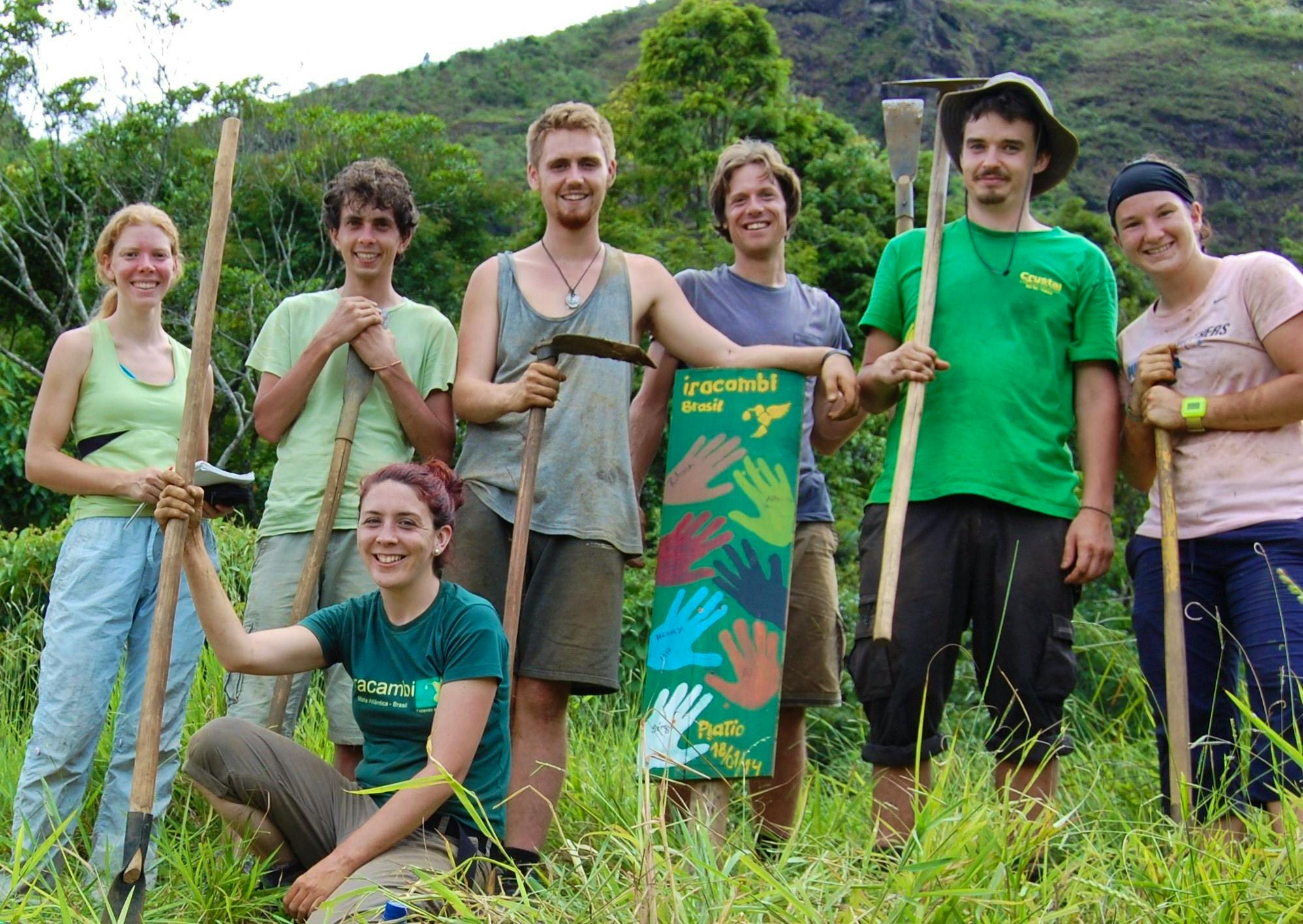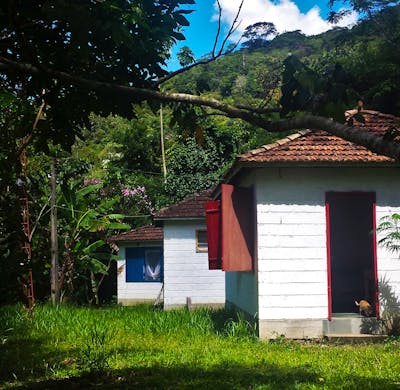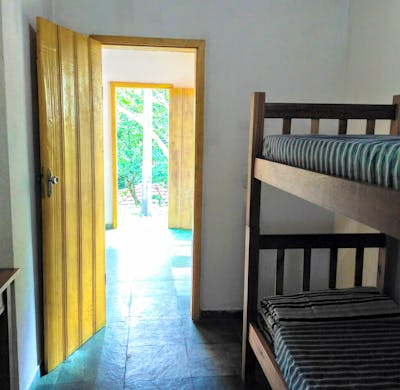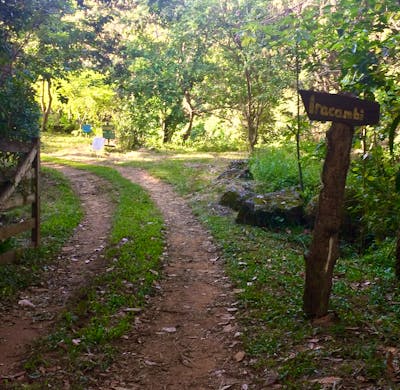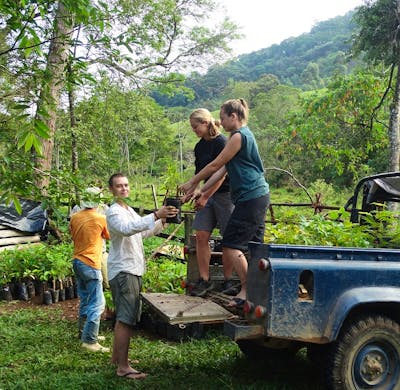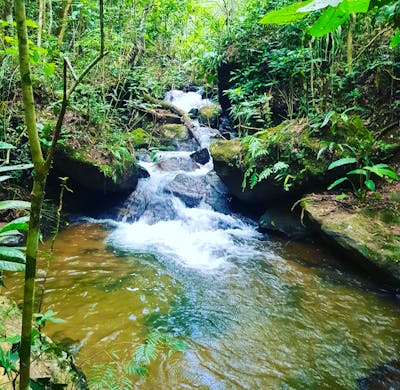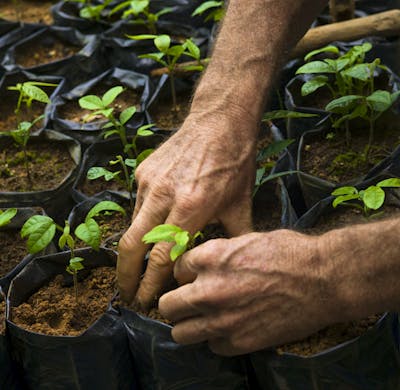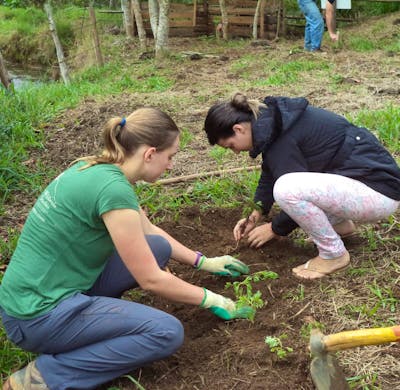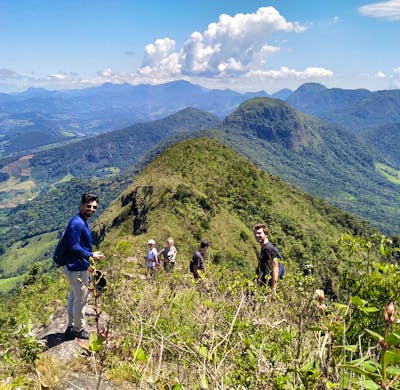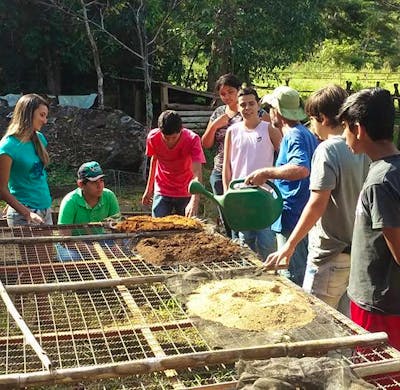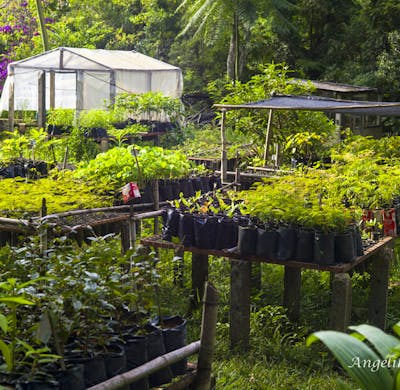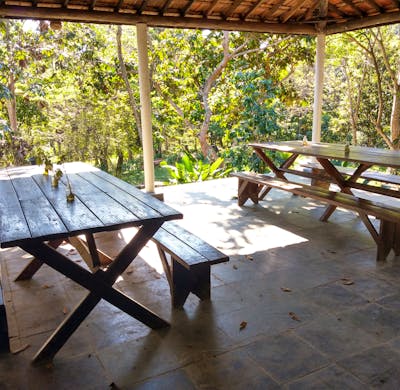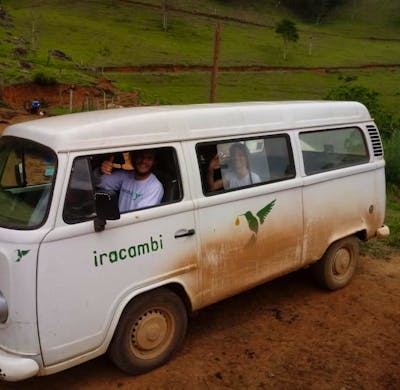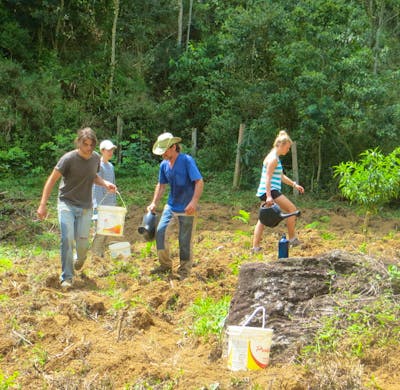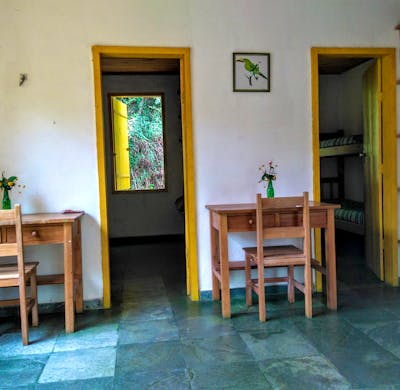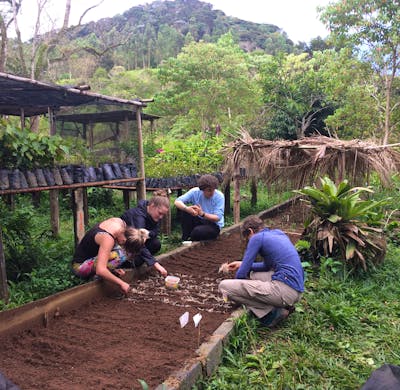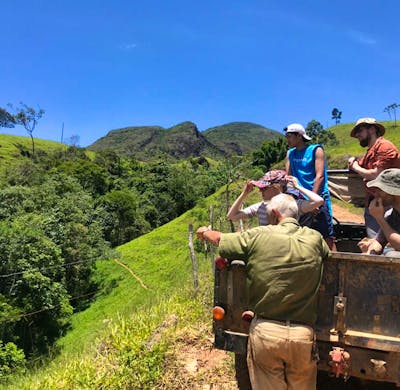We warmly invite you to join us at the Iracambi Rainforest Center in Brazil's Atlantic Forest, where you can obtain firsthand experience in reforestation, medicinal plants, community outreach, and environmental education.
For over twenty years, we’ve planted over 140,000 native forest trees, founded the first program of environmental education in the region, set up the first web-based GIS, created thousands of acres of protected areas, hosted 2000 international students and volunteers from 70 countries, and impacted the lives of thousands of people in the Serra do Brigadeiro mountains.
Iracambi alumni (we call them Iracambistas) are spreaded across the world, and all possible activities bring the idea of making the world a better place. Whether you stay for one or six months, you will leave us enriched, as you will enrich your surroundings whenever it may be.
Together with volunteers, students, supporters, and communities, we are willing to plant trees and create a new scenario for the Atlantic Forest biome in Brazil. Our focus is Saving Forests and Changing Lives, and we would love you to be part of it!
The Forest 4 Water Program focus on helping local farmers as we all together plant native and productive tree species to increase farm incomes, restore degraded soils, protect water sources, and improve the habitat for biodiversity.
Iracambi is in responsible for preparing and caring for the seedlings, planting, and monitoring the planted trees. The help of volunteers is essential in all the different stages and practices involved in this process, starting with the favorite place on our campus: the nursery. Creating and maintaining healthy seedlings requires a lot of work: from collecting seeds to nurturing them until becoming seedlings, and ensuring they are healthy enough to be planted.
The seedlings usually are planted at a specific time of the year with the beginning of summer rains, this method increases the chances of their survival.
Planting trees requires visiting farmers at different periods of the process (before, during, and after planting) to choose the area for planting, prepare the soil, and maintain the trees for two years. That way, we can offer the needed guidance to achieve the best results!
By volunteering you gain experience in reforestation, plant biodiversity, getting to know properties, rural producers and their way of life, learning and applying techniques for collecting, identifying seeds and plants, planting and monitoring, and many more!
It is all about saving forests - so what about changing lives? At Iracambi, we also work with local farmers, school kids, volunteers, and visitors, hosting visits, running workshops and outreach programs designed to raise awareness of the issues of how to live sustainably, and how to encourage more and more people to join us in the exciting task of protecting one of the most important forests in the world.
We invite you to participate in our ongoing projects and encourage you to take responsibility for your work, experience, lifestyle, and for your fellow Iracambistas. Besides that, having your own study project or particular passion is another possibility for you develop here. For that, we can give you the space and support that you need for that as well. If you have a brilliant idea for something we could or ought to do, let’s see if we can do it!
Iracambi is located in the buffer zone of the Serra do
Brigadeiro State Park. The park’s craggy mountains and deep
ravines protect an extraordinary range of biodiversity,
including the largest known population of Brachyteles
hypoxanthus, the Wooly Spider or Muriqui monkey.
Life at
Iracambi
Iracambi is what
you make of it...
Studying, interning, volunteering or visiting
Iracambi provides you with a fantastic
opportunity to be part of a lifestyle that is
likely very different from what you are
used to. You will be sharing the Research
and Conservation Center with people of
many different nationalities, backgrounds,
skills, ages and interest, and everything
right in the center of Atlantic Rainforest.
You be living either in the Center itself or in
one of the four cabins. The Center, which is
+75 years old, has four bedrooms, each
hosting up two people, a living room, library
and two bathrooms. The cabins each have
two bedrooms, bathroom and a living room.
The houses are well maintained and have
electricity, hot showers and wireless access
24 hours a day.
We have a restaurant, that provides three
delicious meals a day.
Costs
The fees covers volunteer accommodation, internet access 24
hours a day, 3 meals a day (breakfast, lunch and dinner) at the
restaurant at Iracambi. Also project costs and investments.
Volunteers are responsible for the payment of additional
costs, such as travel costs, visa costs, etc. In addition, you may
also want to go out for dinner and do weekend activities.
The cost of dinner outside Iracambi(without drinks) ranges
from 15 to 30 reais. The cost of the tours (including a guide,
equipment and entrance fee) comes to about 100 to 140 reais
depending on the activity and how many volunteers come.
The currency in Brazil is Real. Check with your bank to see if
your cards will work in Brazil, be sure to memorize your pin
code, and inform your credit card company that you will be
traveling overseas.
The nearest ATM to Iracambi is in Muriaé (1.5 hours.) Please
note that you cannot change dollars in Muriaé. Change money
at the airport on arrival.
Most ATMs will not accept American Express, it’s a good idea
to bring a Visa credit/debit card. ATMs provide a better rate
than money exchange places (casas de câmbio).
Health and travel
insurance
Please note that Iracambi requires you
to have health and travel insurance.
Please take measures to cover yourself
prior to departure for Iracambi. It may
also be possible to extend your home
insurance coverage to cover you for
overseas travel. You will need to send
the details of your insurance, together
with details on your next of kin, to
Iracambi before your departure to Brazil.
Make sure to familiarize yourself with the
international medical coverage your
country has provided and that you know
how to make a claim if necessary. Though
Iracambi takes precautions to ensure the
safety of Iracambistas, we regret that we
are not in a position to accept people with
serious medical conditions or physical
disabilities.
There is a small clinic in Rosário da Limeira
which provides first aid, and an excellent
hospital in Muriaé.
Vaccination
It is important that you ensure you are
inoculated against the following:
- Hepatitis A
- Tetanus
- Typhoid
- Yellow Fever
- Diphtheria
- Polio
Iracambi is not located in a malarial area,
but if you plan to travel to other parts
of Brazil, such as the Pantanal or the
Amazon, you will need a suitable
prophylactic, which you can pick up in
Brazil. Your doctor may also suggest
Hepatitis B and Rabies, but you are
unlikely to need them.
Visas
All volunteers who wish to stay
under 6 months should apply for
a tourist visa and not a volunteer
visa.
Visas are required for tourists of
several countries, including
Australia. You can now get these
easily online within five days!
Please check what the visa
conditions are for your entry
into Brazil. Visas are valid for 90
days, with a possible extension
for another 90 days.
European nationals do not require visas but are issued with a visitor’s pass
on arrival, these are also valid for 90 days, with a possible extension. If you
are from a European country that has adopted the Schengen protocol you
will not be able to renew your visitor’s pass beyond 90 days. The UK is not a
Schengen protocol country.
For volunteers coming from other countries, be sure to check visa requirements
for your nationality!
For visa or visitor pass renewals, in case you wish to stay longer than 90
days, you will need to head to the nearest federal police headquarters, in
Juiz de Fora, Rio de Janeiro or Belo Horizonte, making sure it is on or before
your 90 days is over or else you may be fined! After renewing your visa or
visitor pass, you are permitted to be in the country for 90 days from the date
of renewal, so make sure you count the days correctly before you plan to
leave the country or again you may be fined.
If you need to state your address on arrival, her
If you need to state your address on arrival, here it is: Fazenda Iracambi,
Rosário da Limeira, 36878-000 - Minas Gerais, Brazil.
Please check your specific visa and travel regulations yourself before you
come to Brazil!
Language
In order for us to be able to
communicate with you, we require
that you speak either English or
Portuguese! Although you will be fine
at Iracambi without a word of
Portuguese, you’ll get much more out
of your visit if you can communicate,
at least a little, in Portuguese.
If you are interested in community-based research work it will be
essential to speak Portuguese, and
even if you are not, you will find that
even the most slender command of
Portuguese will enormously enrich
your time speaking with our wonderful
neighbors, most of whom do NOT
speak English.
What to Bring
- Equipment: mosquito repellent,
sunscreen, sleeping bag (we provide
all bedding so this is only for
camping), tent (if camping), camera,
a towel, laptop for work, flashlight.
If you buy a sim card make sure it is
CLARO or VIVO. A mosquito net.
- Documents/Money: credit card,
passport, visa, proof of
vaccinations, print out of your
medical and travel insurance.
- Entertainment: books and movies
on your computer.
- Clothing: walking shoes, boots
(waterproof is a good idea), shoes to relax
in; sweater/jacket, waterproof coat (the
very rainy season is between December and
March but you should always bring a
waterproof), swim wear, various long and
short sleeved shirts as well as long pants
and shorts, work gloves. We recommend
dark colored clothes, and remember that
jeans take a long time to dry!!
It is advisable that you bring
your own laptop and a pair of
hiking boots (we recommend
you invest in boots with good
ankle support as the
countryside around Iracambi is
very hilly).
Security
- Rio de Janeiro: Like any big city in
Brazil, you should be cautious, always
keep as little money on you as
possible, never flash cash, jewelry,
cameras or phones, and never walk
alone at night in unsafe areas. Be
observant and vigilant, always take
note of your surroundings and listen
to your instincts. See how the locals
are acting and try your best to blend
in. Having said that, Rio is a marvelous
city, and if you take elementary
precautions you will fall in love with
it.
- Iracambi: Far from the big cities,
Iracambi is extremely safe, and you
can relax and enjoy the the natural
beauty on all sides.
- Wildlife: We are located in the
middle of the forest, which makes it
an extremely special place for
observing nature, but you should
also stay alert to avoid unexpected
encounters with snakes and spiders!
A few precautions, such as always
wearing shoes and emptying them
out before use and being cautious
when walking are simple steps that
can reduce the risk of a bite. But
don’t worry, it is very uncommon to
even see a snake and in eighteen
years, we have only had one case. If
you should get bitten, a shot of antivenom in the local hospital will put
you right in a few days.
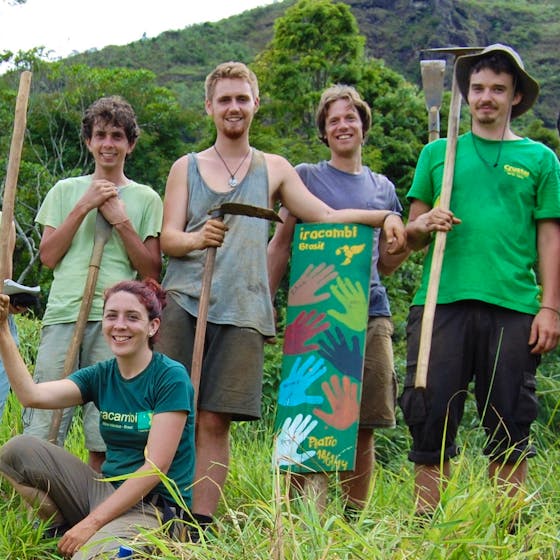
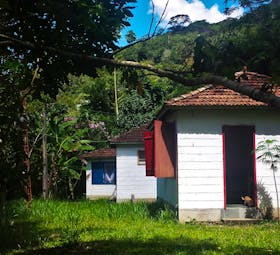
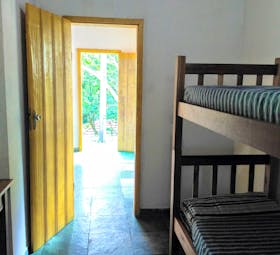
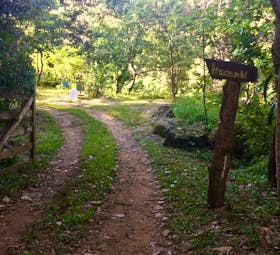
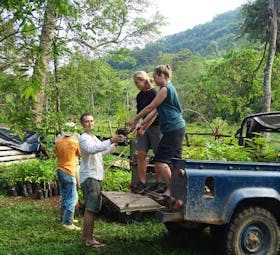


 4.8
4.8

